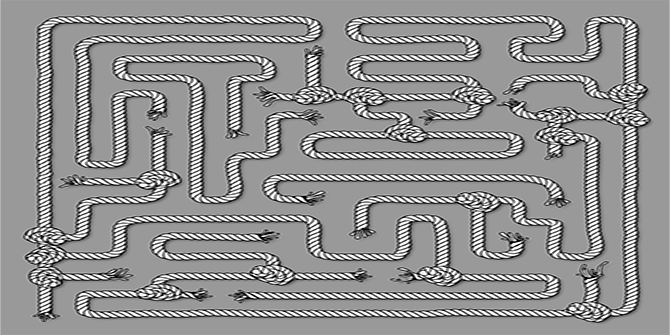 With the Leave.eu campaign pledging to win back the UK, and with The Britain Stronger in Europe campaign pledging to explain the “true reality of life” outside the EU, arguments for and against UK’s membership give and take daily. Here, Dennis Novy explains why a divorce from the EU would risk putting the UK in a weaker economic position.
With the Leave.eu campaign pledging to win back the UK, and with The Britain Stronger in Europe campaign pledging to explain the “true reality of life” outside the EU, arguments for and against UK’s membership give and take daily. Here, Dennis Novy explains why a divorce from the EU would risk putting the UK in a weaker economic position.
The option of Britain leaving the European Union sounds superficially attractive. Who doesn’t like the idea of freedom and independence? But it isn’t as simple. In fact, Britain needs Europe a lot more than Europe needs Britain. Isolation is costly.
International trade
Look at international trade. The British economy is heavily exposed to the European Union. The EU is by a mile Britain’s biggest trading partner, covering roughly 45 per cent of imports and exports. In the other direction, Britain is only responsible for less than 10 percent of trade of other EU countries. This asymmetry inevitably results from the fact that the British economy is relatively small compared to the rest of Europe.
To facilitate trade with the European Union, Britain has an interest to adopt the regulations that govern EU trade and investment, with the Single Market at the core. At the moment, Britain still has a place at the negotiating table and plays a part in determining those regulations.
If Brexit happened, Britain would become a passive receiver. This would be the model of Norway and Switzerland. Those countries adopt the same regulations but have essentially zero say. By the way, Norway makes an annual financial contribution to the EU in return for access to the Single Market. From 2009 to 2014, Norway paid almost 1.8bn euros.
Foreign investment
Look at foreign direct investment. Britain has historically received a disproportionately large share of investment coming from non-EU countries. Yes, Britain has an English-language advantage and generally a pro-business climate. But another major reason has been that Britain was perceived by foreigners as an export platform that benefits from easy access to the EU and similar regulations and standards. Once Britain left the EU, this advantage would be eroded.
Look at immigration. It is tempting to blame Britain’s problems on immigrants. However, academic research shows that we need immigration to pay our bills. One reason is the declining fertility of the native British population. Another reason is the skills gap in the British labour market.
The European Union will not accept a deal that allows free trade and investment with an “independent” Britain but without any mutual migration. It is a fantasy to believe that Britain could fully control immigration from the EU once it left. Again look at Norway and Switzerland where migration to and from the EU is commonplace, not least because EU countries demand it.
Then look further abroad beyond Europe. One claim of Brexit campaigners is that an independent Britain would be able to negotiate its own free trade agreements. That is true. But those agreements would be dramatically worse than what the European Union can achieve.
Take the example of the Transatlantic Trade and Investment Partnership or TTIP, a trade agreement that the EU currently negotiates with the United States. If Britain negotiated by itself, it would lack the EU’s negotiating power. The US would possibly make Britain a “take-it-or-leave-it” offer, which is in essence how trade agreements have been negotiated with smaller countries such as Peru or Columbia. But as part of the EU, Britain has leverage and can implement its priorities. Size does matter.
Another, often overlooked issue is that Britain simply does not have the administrative expertise to carry out some of the functions that the EU currently fulfils on behalf of its member states. Again, take the example of international trade negotiations and TTIP. The team hammering out agreements under the guidance of the EU Trade Commissioner in Brussels consists of some of the most experienced and seasoned operators in the business, drawn from all over Europe. These are the best and brightest in the game that can stand up to the venerable team working for the US Trade Representative. It would take Britain years – and serious government resources – to try and match that expertise.
Weakened already
In fact, the Brexit debate is already damaging to British interests right now. Other EU countries do not like the antagonistic approach. They are increasingly irritated at Britain’s hesitation to cooperate, for example when it comes to taking a reasonable share of refugees from Syria.
Eyebrows are also being raised outside of the EU. President Obama has made it clear that he prefers Britain to remain in the EU. When it comes to EU business, many policy makers in Washington are listening less to Britain than they otherwise would, anticipating the decline of British influence in Brussels. Instead, other EU countries like France and Germany increase their impact at Britain’s expense. In other words, Britain’s negotiating hand is already weakened today by the Brexit cloud hanging over the country.
In summary, we cannot just ask whether Britain should leave the EU or stay. The public debate should be relentless in focusing on the counterfactual scenario of a post-Brexit Britain. We have to ask: what would the world look like if Britain were on its own? How exactly would Britain’s international trade be affected? Would foreign direct investment into Britain decline? How can the British government match the policy expertise concentrated in Brussels? And how would other countries perceive a Britain that has lost its crucial influence in Europe?
Note: This article gives the views of the author, and not the position of the British Politics and Policy blog, nor of the London School of Economics. Please read our comments policy before posting.
_________
 Dennis Novy is Associate Professor in the Department of Economics at the University of Warwick and Associate at the Centre for Economic Performance at the London School of Economics. He tweets at @DennisNovy
Dennis Novy is Associate Professor in the Department of Economics at the University of Warwick and Associate at the Centre for Economic Performance at the London School of Economics. He tweets at @DennisNovy
(Featured image credit: Moughan CC BY-NC 2.0)








This article contains worring inaccuracies and obfuscations:
“If Brexit happened, Britain would become a passive receiver”- UK could also be an independent WTO member or an EFTA member that is not an EEA member.
Norway has 250% of UK per capita income. UK would pay 40% of Norway’s contribution.
The Foreign investment by the Eurozone in the UK leads to a primary income deficit of about £40bn per annum and results in sucking a large number of EU workers into the UK. Most EU foreign investment is purchases of UK companies by EU State controlled industries and UK properties by offshore companies. The UK is deprived of company taxes because these are paid in the home country of the investor and deprived of invested profits because profits are remitted home. Some companies such as Aldi and EDF import stock and plant directly from EU warehouses which fuels the enormous trade deficit with the EU.
“But those agreements would be dramatically worse than what the European Union can achieve.” EFTA has achieved comparable trade agreements to the EU and the WTO has lowered tariffs generally – it is not the 1970s
Such shallow worn out arguments and nothing new – all have been entirely refuted time and again to the point of boredom. The only take aways are i). the Stayers are intent on droning on the same fear mongering messages in the hope it will cause sufficient concern in the undecideds, ii). such research for hire by the Eurocracy in brussels desperately hangs on to the apparent status quo preferences in the electorate to make their job easy for them.
The game changer in this process must be the Leavers’ passionate vision for the independent empowered Britain, using its people’s spirit of intrepid endeavour, inventiveness and entrepreneurialism to continue to punch well above its weight/size as it has done . . . forever. Incidentally, it is this spirit supported by institution of law that continues to attract people and capital here – not some club membership in a failed and corrupt customs union.
Firstly Europe is not the EU & secondly this country has a massive trade cdeficit with the EU compared to the rest of the world. Therefore the advantage of allegedly having a massive “home” market on our doorstep does not exist
The EU needs Britain a lot more than Britain needs the EU, and note the EU is not Europe, it is a custom union the UK could well do without.
Perfect denial of geopolitics….
Another talking head. Sorry but considering the closed nature of the TTIP framework, the self immolation of the Euro, the lack of democracy in the EU commission, the catastrophe of immigration, the bullying of Greece and now the Portugese electorate I think you are talking arcane nonsense. But then again we know that academics live in ivory towers and the EU builds the tallest ones.
@Simon What exactly will Britain do, to make a living, if it leaves the EU & the euro, and the Europeans then crater or at least refuse to cooperate? Offshore tax haven, for European & US & other firms? The world has too many such havens already: market glut, like building more Starbucks, max’ed out…
British manufacturing & agriculture are minuscule, now: so it’s services — but service industries need clients & customers. London is FunCity, tho expensive, & unless Britain is prepared to live on 10% corp tax or less it won’t be the only contender for that trade — there’s Ireland, & the Caribbean, & Cyprus, Singapore, Hong Kong, lots of very smart & now-experienced & increasingly-digital competition, out there. Are you thinking The World will come to London to do its banking? London is a _long_ way from Asia, where the clients & customers are: old salesman’s adage is that you can’t wait for the customer to come to you, you have to go to the customer…
The great trade history of The City was part entrepreneurial genius & part The Empire: some of the genius still is there, but The Empire is long-gone. Why should Asia go all the way to London for its money? What comparative advantage would London & Britain offer now?
I seem to recall that the LSE receive a large amount of funding from the EU.
Europe needs Britain, too… We are generating a global geopolitics of failed states & tax havens, one heavily-armed & with nuclear weapons proliferating everywhere — recipe for dissension & disasters — isolationism has caused wars before & it will do so again, we need unity & trade instead.